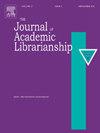Toward a conceptual framework on mobile information literacy in higher education
IF 2.3
3区 管理学
Q2 INFORMATION SCIENCE & LIBRARY SCIENCE
引用次数: 0
Abstract
Objective
There has been limited exploration of the relationship between information literacy and mobile learning, especially in the emerging research area of mobile information literacy in higher education.
Method
A literature search focused on the convergence of information literacy and mobile learning. Using ATLAS. ti 24 software, qualitative content analysis was carried out through systematic and interpretive approaches, emphasizing the frequency and co-occurrence of various categorized themes.
Results
Four key categories: educational, informational, situational, and technological. The educational includes themes related to learning, higher education, students, mobile learning, assessment, and academic disciplines. The informational encompasses themes such as information literacy, the information literacy framework, competencies in information literacy, and mobile information literacy. The situational focuses on themes associated with universities, academic libraries, and stakeholder collaboration. Lastly, the technological highlights mobile technology, mobile devices, and connectivity. These themes form the basis of our proposed conceptual framework for mobile information literacy. Its main components are information literacy and mobile learning. Supporting themes are the framework and competencies related to information literacy, mobile technology, and mobile devices. Structural elements encompass themes such as higher education, learning, disciplines, learning communities, universities, libraries, collaboration, and connectivity.
Conclusion
This is an open, flexible, and feedback-driven framework.
高等教育中移动信息素养的概念框架
目的对信息素养与移动学习之间关系的探索有限,特别是在高等教育中移动信息素养这一新兴研究领域。方法对信息素养与移动学习的融合进行文献检索。使用阿特拉斯。Ti 24软件,通过系统和解释的方法进行定性内容分析,强调各种分类主题的频率和共现性。结果四个关键类别:教育性、信息性、情景性和技术性。教育主题包括与学习、高等教育、学生、移动学习、评估和学科相关的主题。信息包括信息素养、信息素养框架、信息素养能力和移动信息素养等主题。情境关注与大学、学术图书馆和涉众协作相关的主题。最后,技术重点是移动技术、移动设备和连接。这些主题构成了我们提出的移动信息素养概念框架的基础。其主要组成部分是信息素养和移动学习。支持主题是与信息素养、移动技术和移动设备相关的框架和能力。结构元素包括高等教育、学习、学科、学习社区、大学、图书馆、协作和连接等主题。这是一个开放、灵活、反馈驱动的框架。
本文章由计算机程序翻译,如有差异,请以英文原文为准。
求助全文
约1分钟内获得全文
求助全文
来源期刊

Journal of Academic Librarianship
INFORMATION SCIENCE & LIBRARY SCIENCE-
CiteScore
5.30
自引率
15.40%
发文量
120
审稿时长
29 days
期刊介绍:
The Journal of Academic Librarianship, an international and refereed journal, publishes articles that focus on problems and issues germane to college and university libraries. JAL provides a forum for authors to present research findings and, where applicable, their practical applications and significance; analyze policies, practices, issues, and trends; speculate about the future of academic librarianship; present analytical bibliographic essays and philosophical treatises. JAL also brings to the attention of its readers information about hundreds of new and recently published books in library and information science, management, scholarly communication, and higher education. JAL, in addition, covers management and discipline-based software and information policy developments.
 求助内容:
求助内容: 应助结果提醒方式:
应助结果提醒方式:


